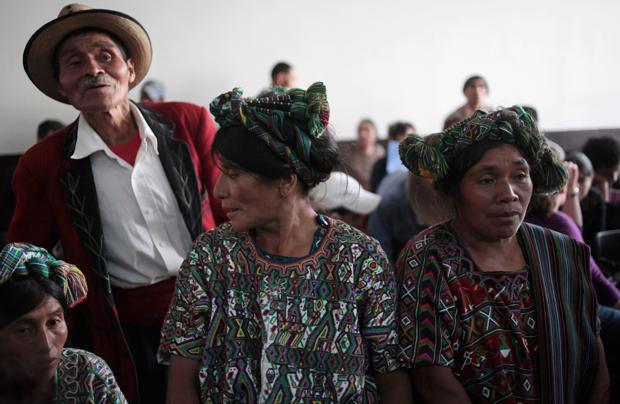Ríos Montt on Trial for War Crimes in Guatemala
Indigenous people attend the trial against the former Guatemalan dictator Rios Montt at the Supreme Court of Justice in Guatemala City. (Photo: Jorge Dan Lopez/REUTERS)
After seizing power in a 1982 military coup, José Efraín Ríos Montt was blunt about the coming violence. His troops were accused of slaughtering thousands of Guatemalan Indians.
“We are going to kill,” he said in this 1982 interview. “But we are not going to assassinate.”
Now, three decades later, Rios Montt is finally facing prosecution for war crimes. The trial, now under way, is expected to last at least a year.
Guatemala’s civil war between government forces and communist rebels lasted 36 years, but Ríos Montt’s 17 months in power comprised the most brutal period. A UN Truth Commission found that nearly half of the war’s human rights abuses occurred during Ríos Montt’s first year. Yet, he was never held responsible.
The war finally ended in 1996. By then Ríos Montt had been elected to the Congress, which gave him immunity from prosecution. But this past January, he finally resigned from the Congress at the age of 85, and prosecutors pounced. He is now under house arrest.
Prosecutors in a Guatemala City court, where Ríos Montt and several of his former military aides are being tried for genocide and war crimes, contend that Ríos Montt’s troops unleashed a campaign of massacres and rapes in northern Guatemala designed to eliminate the region’s Ixil Indians. Army officers accused them of harboring Marxist guerrillas.
Edwin Calil, a survivor of Ríos Montt’s crimes attending the trial, said troops burst into his village looking for rebels and executed nine members of his family when he was six.
“They killed my grandmother, my mother, four sisters and three cousins,” he said.
Danilo Rodriguez, the lead defense attorney, said his client is not guilty of genocide and that Ríos Montt’s troops were bent on destroying guerrillas, not an entire ethnic group.
“Atrocities were committed,” Rodriguez said. “But they don’t add up to genocide.”
There were so many atrocities that when Ríos Montt was formally charged in January it took the judge three hours to read them all. Yet few Guatemalans are paying much attention.
Jose Leiva, a 27-year-old greeting cards seller at the downtown central market in Guatemala City said he grew up long after Ríos Montt had ruled the country and knows almost nothing about the former dictator. His high school wasn’t much help on that front as well because he said teachers focus on tamer subjects such as Guatemala’s mountains and volcanoes, providing little insight about the war.
The Rios Montt trial is a high-profile effort to examine that past. Yet the army still defends the scorched-earth tactics of the 1980s as a necessary evil. And it still wields vast influence. The current President Otto Perez is a former general who served under Ríos Montt.
Beyond the court room, one of the few places in Guatemala City where the war’s atrocities are on vivid display is at the Foundation for Forensic Anthropologists, a group that excavates mass graves.
“I don’t know if we can define it as a museum, but it is more like an effort for the memory, so the people don’t forget what happened in this country,” said foundation member Isaac Rodriguez.
Rodriguez pointed to a wall decorated with military documents from the early 1980s that reveal the fate of political prisoners and read “Manuel Alfredo Molina, 300. Otto Leonel Juarez, 300.” He explained that the 300 after each name is a military code, which means that the prisoner was secretly executed.
“And you can see how big and powerful were the killing machine,” he said.
A few blocks from the museum is the National Cathedral and the names of thousands of people engraved on the stone pillars outside this monument are another reminder of Ríos Montt’s rule.
It is a moving tribute, similar to the Vietnam War memorial in Washington, but cars zip past without stopping and for the most part churchgoers stride into the Cathedral ignoring the endless list of victims.
